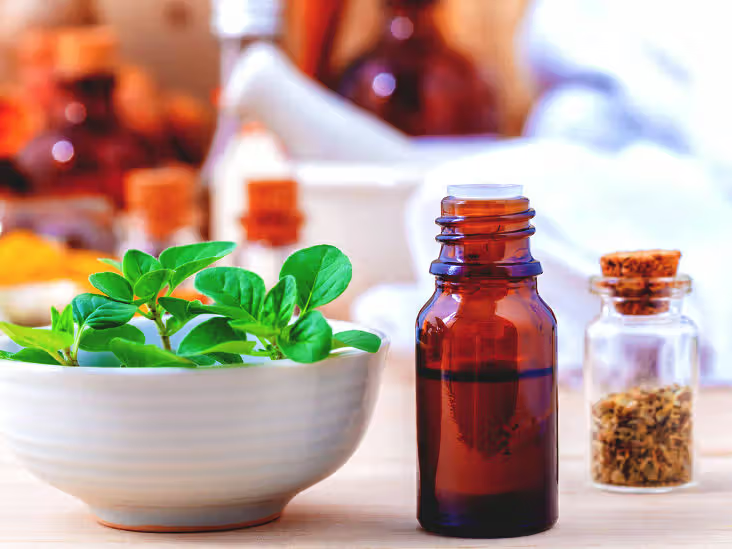Oregano oil has long been valued in natural medicine for its potent health properties. Extracted from the leaves and flowers of the oregano plant (Origanum vulgare), this essential oil is rich in compounds that deliver antimicrobial, antioxidant, and anti-inflammatory benefits. We explore the extensive uses of oregano oil, how it can support wellness, and best practices for safe use.
The Unique Composition of Oregano Oil
Oregano oil owes its health-promoting properties to its rich content of bioactive compounds, particularly:
Carvacrol – A powerful phenol known for its antimicrobial and antifungal properties.
Thymol – An agent that supports the immune system and helps prevent fungal infections.
Rosmarinic acid – A strong antioxidant that helps neutralize free radicals.
The synergy of these compounds makes oregano oil a potent natural remedy used worldwide.
Health Benefits of Oregano Oil
Potent Antimicrobial Action
Oregano oil is renowned for its ability to combat harmful microorganisms. Studies indicate that it can inhibit the growth of bacteria like Staphylococcus aureus and Escherichia coli. This makes it a valuable natural solution for supporting immune health and addressing bacterial imbalances.
Supports Respiratory Health
Inhaling diffused oregano oil or using it diluted in steam inhalation can help soothe coughs and clear nasal congestion. Its natural expectorant properties assist in loosening mucus and promoting easier breathing.
Powerful Antioxidant Protection
The high antioxidant content in oregano oil helps combat oxidative stress, which contributes to aging and chronic diseases. By neutralizing harmful free radicals, it supports overall cellular health and resilience.
Promotes Digestive Wellness
Taken in appropriate, diluted doses, oregano oil supports digestive function by stimulating bile flow and combating gut pathogens. It is often used to address bloating, gas, and irregular digestion.
Natural Fungal Fighter
Thanks to its high carvacrol and thymol content, oregano oil is effective against fungal infections like Candida albicans. It is commonly applied in diluted form to help manage nail fungus, athlete’s foot, and skin yeast infections.
Common Uses of Oregano Oil
Topical Applications
When diluted with a carrier oil (such as olive or coconut oil), oregano oil can be applied to the skin to target fungal or bacterial concerns. It is essential to perform a patch test to ensure skin compatibility.
Oral Use (with Caution)
Oregano oil supplements or diluted drops are sometimes used internally for immune support or digestive health. Internal use should only be done under professional guidance, as the oil is highly concentrated.
Aromatherapy
Adding a few drops of oregano oil to a diffuser helps purify the air and support respiratory health. It blends well with oils like eucalyptus and tea tree for enhanced benefits.
Household Uses
Due to its natural antimicrobial properties, oregano oil can be added to homemade cleaning solutions to help disinfect surfaces safely and naturally.
How to Use Oregano Oil Safely
Dilution is essential: Never apply undiluted oregano oil directly to the skin or take it internally without proper guidance.
Recommended dilution: Typically, 1–2 drops of oregano oil per teaspoon of carrier oil is sufficient for topical use.
Short-term use: Prolonged use of oregano oil internally or externally is not recommended without healthcare supervision.
Avoid sensitive areas: Keep oregano oil away from eyes, mucous membranes, and broken skin.
Potential Side Effects of Oregano Oil
While oregano oil is natural, improper use can lead to adverse reactions, including:
Skin irritation or allergic reactions when applied undiluted.
Digestive upset if consumed in excessive amounts.
Risk of interactions with medications, especially blood thinners and diabetes treatments.
Pregnant and breastfeeding women, as well as individuals with specific health conditions, should consult their healthcare provider before using oregano oil.
Choosing High-Quality Oregano Oil
For the best results, select oregano oil that meets the following criteria:
Organic and non-GMO: Free from pesticides and artificial additives.
Standardized carvacrol content: Look for oils containing at least 70% carvacrol for optimal efficacy.
Steam-distilled extraction: Ensures purity and preserves active compounds.
Conclusion
Oregano oil stands out as a versatile natural remedy with impressive health benefits backed by traditional use and modern research. Its applications in immune support, respiratory health, digestion, and skincare make it a valuable addition to natural wellness routines, provided it is used safely and responsibly.

